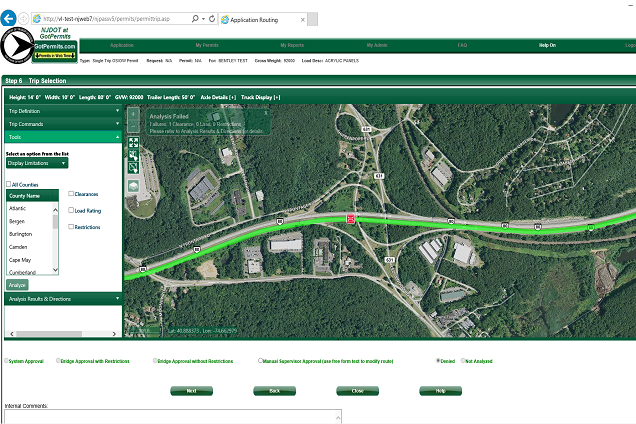NJDOT Increases Permit Issue Rate 33%
New Jersey DOT Case Study
Prior to 2010, New Jersey handled its oversize/overweight (OS/OW) permitting manually through the Motor Vehicle Commission using a non-route-specific paper process. To increase public safety and protect the state’s infrastructure, however, the New Jersey Department of Transportation (NJDOT) required a solution that ensured all OS/OW vehicle permit applications were properly checked against permit law, rule, and policy, as well as against existing infrastructure limits. NJDOT needed to maximize the automated issuance of permits, plus analysis of routes, bridges, and restrictions, while minimizing the manual review time required by its staff. A further challenge included the need to achieve all these objectives without adding any new information technology costs. With over 5,000 unique log-ins, more than 14,000 hauling companies with varying technology experience, NJDOT needed a cost-effective, accessible, and user-friendly application to ensure adoption of its new processes and solution across the trucking industry.

Solution
Working with Bentley, NJDOT deployed SUPERLOAD as the foundation for its automated OS/OW permitting, routing, and analysis system. Established via a public private partnership (PPP) transaction-fee-based approach, which automatically passes transaction fees onto permit applicants, the system reduced the implementation cost and risk for NJDOT. The software was configured to enable data input for permit administration, comprehensive routing, clearance and bridge analysis, restriction management for construction activity, and automated applicant notifications to accommodate changes after permit issuance. Using Bentley software, NJDOT has improved public safety, promoted efficient interstate and intrastate commerce, and increased industry compliance.
Outcome
Since its launch in 2011, Bentley’s SUPERLOAD system, which is accessible 24-hours a day, 7-days a week, has increased the automatic permit issuance rate by 33 percent. In 2016, 80 percent of the 105,000 permits granted, were automatically reviewed and issued by the system without human intervention. The automated process has considerably reduced the amount of time it takes to issue permits. Based on the level of system issuance and minimized need for manual review, about 92 percent of all permits are issued in less than two hours, 94 percent in less than four hours, and about 99 percent in less than two days. By improving the turnaround time for applicants, it is estimated the trucking industry is saving up to USD 16 million per year in idle time. In addition, the ability of the SUPERLOAD system to provide automated, consistent reviews of every application and trip reduces the risk of damage to the state’s infrastructure to the lowest level possible.
Software
Using SUPERLOAD enables NJDOT to perform real-time live load analysis of every bridge crossed by overweight vehicles, optimizing public safety and protection of roadway infrastructure assets. The application enables roadway and bridge crossing data to be shared and stored for every permitted trip, offering limitless querying capabilities. The functionality further enables the use of historical data for transportation planning, law enforcement, and regulatory compliance
Bentley Systems is a global leader providing engineers, constructors and owner-operators with comprehensive software solutions for advancing the design, construction and operations of transportation infrastructure. Bentley has provided solutions to highway agencies for more than three decades, and its proven and reliable solutions will help you manage your road assets on budget and on schedule. Bentley provides a complete solution for intelligent permitting, routing, and restriction management of oversize/overweight (OS/OW) vehicles. SUPERLOAD automates the permitting and routing of your vehicles, including application processing, route selection and analysis, and permit issuance – all in conformance with state restrictions and road conditions.

